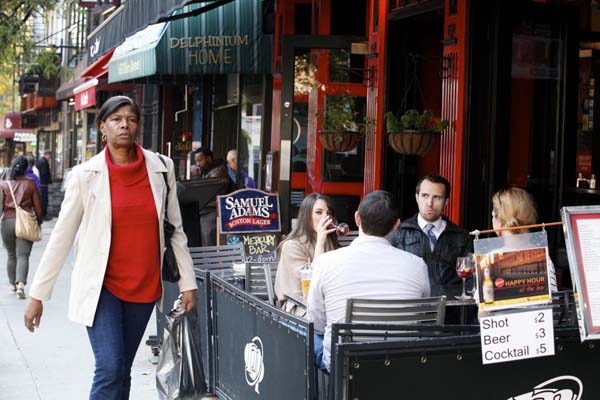
Photo by: Marc Fader
Tired of noise, litter and bodily fluids and wanting to keep the area’s 500 or more nightlife establishments in check, some Hell’s Kitchen residents have taken to community activism.
Thanks to its bars and restaurants, Hell’s Kitchen has a share of the city’s roughly $10 billion a year—and growing—nightlife industry.
But residents say they’re stuck with the bill.
Tired of noise, litter and bodily fluids and wanting to keep the area’s 500 or more nightlife establishments in check, some residents have taken to community activism. Community meetings are their chance to grill a prospective bar or restaurant owner about its operating policies. What are the hours? Will an acoustics expert soundproof the premises? Where will smokers congregate? Often times, their concerns help influence the stipulations under which new bars and restaurants must operate.
These were hardly top-of-mind issues in Hell’s Kitchen back when the neighborhood’s grimy reputation kept crowds and developers at bay.
“I was kind of glad people didn’t want to come west of Eighth Avenue because it kept it quiet,” says Carl Capotorto, 52, who’s lived in Hell’s Kitchen for 15 years.
Today they come in droves. To prevent conflicts between residents and businesses while encouraging economic growth, Community Board 4’s Business Licenses and Permits Committee draws up a unique list of stipulations to which each business must agree in exchange for community support.
Then the committee writes an advisory letter to the State Liquor Authority that recommends, in so many words: deny this business a license unless it follows these stipulations. The Community Board keeps a record of the letters and stipulations on its website.
The system isn’t perfect. If the Community Board overrules the committee’s approval, the stipulations go out the window. That business might succeed in getting a liquor license—only then it doesn’t have to follow any rules.
Still, the process of acquiring a liquor license for a Hell’s Kitchen business can be difficult without community backing. “Our board is a lot tougher and more skeptical now,” says Austin Chinn, 65 and a resident of Hell’s Kitchen for 35 years. “We can thank community activism for that.”
It was largely due to neighborhood opposition that Community Board 4 voted against Boxers NYC in October—the infamous “bar in a schoolyard” debate. Boxers’ owners will have to apply for a liquor license without the board’s support, which can be risky business for either side.
Anticipating a chilly reception from residents, some prospective business owners try to be neighborly early on.
When Eric Einstein wanted to open a bar at 679 Tenth Ave. on the ground floor of a residential building, he knew he had to talk with the neighbors.
First he pitched to HK5051 Neighborhood Association, whose main concern was outdoor seating. Then he invited residents and neighbors of 679 Tenth Ave. to a nearby coffee shop to express their concerns. The question of outdoor seating resurfaced. He agreed to give it up in exchange for their support, though Einstein says he’ll revisit the issue in six months’ time after he’s proved himself a good neighbor.
“If someone is throwing accusations and saying this will ruin the neighborhood, you can’t argue with that,” says Einstein. “But if they say, ‘This specific thing is a problem,’ you can address that issue and say how you are going to fix it.”
On November 2, Community Board 4 approved a letter of recommendation for Eric’s bar to the State Liquor Authority and a list of stipulations—among them a restriction on outdoor seating.
“I think there would have been more opposition had I not done all the outreach I did,” he said after the meeting.
Paul Seres, Co-Chair of the Business Licenses and Permits Committee and President of New York Nightlife Association, holds a similar view. “You have to take into consideration where you’re putting an establishment and how it’s going to affect the community,” says Seres, who co-authored Best Practices for Nightlife Establishments.
“You have to put your best foot forward.”







